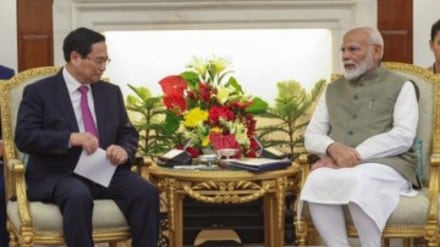India’s relationship with Vietnam reached a significant milestone on Thursday as Prime Minister Narendra Modi announced a USD 300 million loan to enhance Vietnam’s maritime security. The announcement came during the visit of Vietnamese Prime Minister Pham Minh Chinh, highlighting the growing partnership between the two nations. The leaders expressed a shared commitment to double trade and investment within five years, further cementing their alliance in the Indo-Pacific region.
A Key Pillar in India’s Southeast Asian Policy
Prime Minister Modi stated that India views Vietnam as a key pillar of its policy towards Southeast Asia and an essential partner in its Indo-Pacific vision. During their discussions, the leaders acknowledged the major security challenges faced globally, yet they also saw opportunities for cooperation. The visiting leader PM Chinh noted, “The Asia Indo-Pacific region is a locomotive for growth, but it is also where major politics is taking place fiercely. We need an approach and methodology that is global and upholding multilateralism.”
Expanding Cooperation in Various Sectors
The meeting underscored the desire to expand cooperation beyond defence, delving into areas such as semiconductor and green technology, artificial intelligence, cloud computing, and climate action. The inauguration of the “Army Software Park” in Vietnam, facilitated by India’s support, stands as a testament to this commitment. This educational facility, located at the Tele-Communications University in Nha Trang, will equip Vietnamese soldiers with vital digital skills, enhancing their capabilities in an increasingly digital world.
Strategic Agreements and MoUs
The visit also saw the signing of multiple Memorandums of Understanding (MoUs), further solidifying the bilateral ties between India and Vietnam. These agreements cover a broad spectrum of sectors:
Comprehensive Strategic Partnership (2024-2028): An MoU was exchanged by Vietnam’s Foreign Minister Bui Thanh Son and India’s External Affairs Minister S Jaishankar to advance the partnership between the two countries.
Customs Capacity Building: An agreement between the Central Board of Indirect Taxes and Customs (CBIC) of India and the General Department of Vietnam Customs was signed, aiming to enhance cooperation in customs.
Agricultural Collaboration: The Central Agricultural University in Imphal, Manipur, and the Vietnam Academy of Agricultural Sciences in Hanoi inked an MoU to collaborate on agriculture, research, and education.
Legal Cooperation: An MoU between the Ministry of Law and Justice of India and Vietnam’s Ministry of Justice was signed to foster cooperation in the legal field.
Media Cooperation: Prasar Bharati and the Voice of Vietnam signed an agreement to collaborate on radio and television content.
Credit Line Agreements: Two credit line agreements, each worth USD 120 million, were exchanged between the Vietnamese Ministry of Finance and the Export-Import Bank of India, supporting various projects in Vietnam.
Cultural Conservation: A letter of intent was exchanged for the restoration and conservation of the My Son UNESCO World Heritage site, highlighting the cultural ties between the two nations.
A Partnership Rooted in Shared Vision
Prime Minister Pham Minh Chinh praised India’s global outlook and its effective strategy during the COVID-19 pandemic. He acknowledged India’s significant role in providing vaccines and treatments, which benefited Vietnam. Chinh highlighted the evolving global landscape shaped by artificial intelligence, cloud computing, and green transformation. He stressed the importance of international solidarity in addressing the security challenges in the Asia Indo-Pacific region, describing it as a “locomotive for growth.”
A Deepening Bond of Friendship
Chinh expressed gratitude to Prime Minister Modi for sending a National Security Advisor to honour the passing of Vietnam’s Comrade General Secretary Nguyen Phu Trong, emphasizing the depth of the bilateral relationship.
Robust Trade Relations
Bilateral trade between India and Vietnam has seen substantial growth, with trade volumes increasing by 27 percent in 2022, reaching USD 14.14 billion. India’s exports to Vietnam include iron and steel, cotton, cereals, meat and fishery products, electrical machinery, automobile parts, cement, chemicals, and pharmaceuticals. Meanwhile, Vietnam’s exports to India primarily consist of electrical and electronic equipment, inorganic chemicals, machinery, copper, rubber, coffee, tea, spices, iron, and steel. India’s investments in Vietnam are estimated at around USD 1.9 billion, spanning energy, mineral exploration, agriculture, and information technology. In contrast, Vietnam has invested over USD 28.55 million in India, focusing on pharmaceuticals, information technology, chemicals, and building materials.
